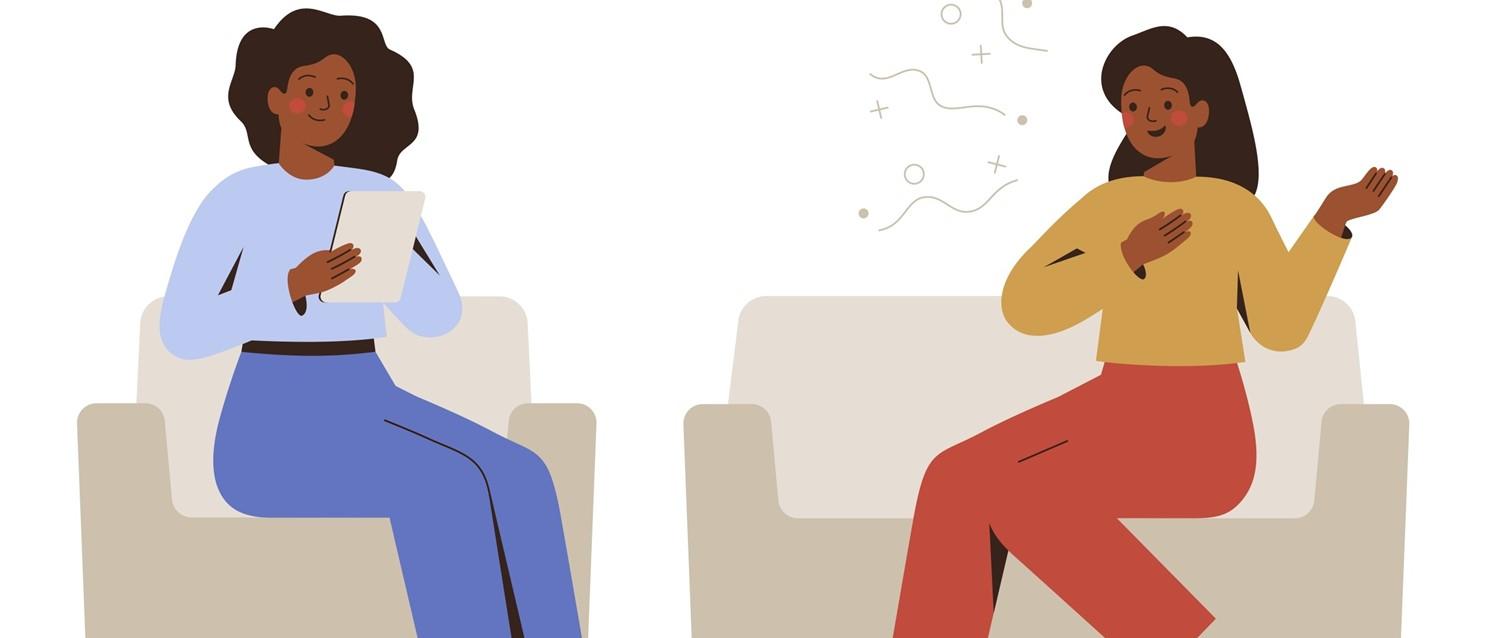
What is dialectical behavioural therapy (DBT)?
Peer reviewed by Dr Sarah Jarvis MBE, FRCGPLast updated by Ellie BroughtonLast updated 16 Nov 2020
- DescargarDescargar
- Compartir
Adults with diagnoses characterised by emotional dysregulation (such as borderline personality disorder) run a much higher risk of self-harm and death from suicide. For people with these diagnoses, evidence-based therapies like DBT can be life-saving.
En este artículo:
Ruth*, now 20, was doing her GCSEs when she noticed that she was getting overwhelmed more and more regularly.
"I used to ignore the warning signs, because I assumed everyone felt like this and that they were all just pushing through and dealing with it," she says. "I thought I was weak for letting myself be controlled by the panic."
When she felt like this, even tiny everyday stimuli - the sound of breathing or chewing, for example - created a physical reaction. Ruth used self-harm to cope and survived an attempt to end her own life. She spent some time in hospital and was given a personality disorder diagnosis before having dialectical behavioural therapy (DBT) through an NHS pilot in her area.
During DBT Ruth learned practical coping skills. For example now when she feels overwhelmed, she makes little origami cranes - a simple but practical way to focus on a task that she knows will make her feel calmer. She also uses techniques from DBT like 'wise mind', which helps her make decisions using emotion and logic, and mindfulness. Ruth is now studying for a BTec and plans to do an HNC next year.
Seguir leyendo
DBT therapy
Luka Hadrych is a psychotherapist in London. In his second year of training, he began working with a client who had a history of self-harm. She reported hurting herself when she felt emotionally overwhelmed. He felt way out of his depth.
"I didn't feel equipped," he says. "We developed a really good supportive relationship but throughout our work, for about nine or 10 months, I had the sense that I wasn't able to provide for this person as fully as I would have liked to at that point in my career.
"The therapeutic relationship and insight-based interventions were not sufficient. This client needed to be equipped with specific tools to support her in overcoming intense urges and regulating strong emotions. The therapy models that I initially trained in didn't offer that."
During his training, Hadrych began to research evidence-based therapies, and discovered DBT. Hadrych now runs a DBT practice in London with ten other therapists. He teaches DBT techniques in four core modules, one of which is emotional regulation. 'Distress tolerance' is a taught skill within this, and through a panoply of exercises (radical acceptance, doing the opposite of how you feel, and - of course - mindfulness) clients get regular practice.
The core modules in DBT are 'distress tolerance', 'emotion regulation', interpersonal skills and mindfulness.
Distress tolerance skills help people cope with the feelings that lead to impulsive behaviour (such as an urge to self-harm, drink or take drugs, or have unsafe sex).
Emotional regulation skills help people recognise and name what they're feeling, so they have more control over how to react.
Interpersonal skills training for things like conflict, empathy, standing up for yourself and meeting new people.
Mindfulness training teaches skills designed to help people become less reactive, practise self-compassion, and focus better.
DBT is an approach first developed by a US therapist, Marsha Linehan, for people who experience affective dysregulation. Linehan herself experienced self-harm and suicidal thoughts before she began her career.
For Hadrych, the evidence for DBT spoke for itself. he says. "When I discovered DBT, it was like a missing puzzle piece for clients with emotion regulation difficulties," he says. "Part of my desire to train in it was for my clients. Rather than being a jack-of-all-trades and imagining that I can support everyone adequately, I could give them what they actually need."
Selección de pacientes para Terapia de salud mental

Tratamiento y medicación
¿Se puede hacer terapia si no se tiene un problema de salud mental?
Hay muchos conceptos erróneos sobre la terapia, como que es sólo para personas que luchan contra un problema de salud mental. Esto no es necesariamente así. La terapia puede ser una forma estupenda de explorar y comprender los problemas que afrontamos cada día, como las decisiones que tomamos en el trabajo, las relaciones o la vida en general.
por Lydia Smith

Tratamiento y medicación
Gestión de la ira
Todos los seres humanos experimentamos ira. La ira es una emoción normal y natural que nos ayuda a reconocer que nosotros, o las personas y cosas que nos importan, estamos siendo maltratados. Es una hostilidad que podemos sentir hacia las personas, pero también hacia los animales y los objetos inertes. La ira puede ser un sentimiento urgente, que puede surgir rápidamente y en el que sentimos que tenemos que actuar con urgencia, o una combustión lenta que afecta constantemente a nuestros pensamientos. A menudo es incómoda tanto física como emocionalmente, ya que tiene componentes físicos y psicológicos. La ira puede ser buena si nos ayuda a corregir errores, afrontar problemas y expresar sentimientos negativos. Sin embargo, también puede ser mala, ya que puede ser perjudicial tanto para ti como para los demás, dañar las relaciones y afectar a tu capacidad para tener éxito. La forma en que gestionamos la ira se ve afectada por nuestras experiencias. Sin embargo, los seres humanos somos constantemente capaces de aprender mejores estrategias para manejar la ira, utilizarla de forma más positiva y reconocer y evitar sus posibles efectos nocivos. Este folleto describe algunas estrategias para controlar la ira. No obstante, si cree que su ira le está perjudicando, o corre el riesgo de hacerlo, a usted o a otras personas, considere la posibilidad de buscar ayuda a través del asesoramiento para el control de la ira, que le ayudará a comprender el origen de su ira y a poner en práctica estas y otras estrategias.
por la Dra. Philippa Vincent, MRCGP
Learning to cope
Dr Dominique Thompson, a former university GP who works in Bristol, has over 20 years' experience working with 18-25s. She's keenly aware of how this overlooked stage of development leaves young adults at a loss, she says. "They haven't developed the bit of the brain they need to dampen down the impulse to react to distress. They can't always stop themselves. Therefore we see self-harm acted out and sometimes even suicide, because of not being able to wait for the appropriate therapy."
Four years ago, Dr Thompson launched a groundbreaking service to reduce harm in this cohort. In its 2016-2019 pilot, the pathway for improving emotional regulation at Bristol ('SHERPA') launched a skills course (ERC) and a therapy group which drew on mentalisation-based therapy (MBT) - similar to the US model of dialectical behavioural therapy (DBT).
During MBT, students met for 90 minutes for the 30 weeks of university terms to learn 'mentalisation' techniques. 'Mentalisation' simply means being able to think about what you're thinking – for example, being aware of whether what you're thinking is positive or negative - making it very similar to DBT.
SHERPA reduced university suspensions, GP appointments, A&E attendance for self-harm and suicide attempts.The ERC specifically was shown to raise students' ability to regulate emotions to a clinical effective level and even led to a reduction in drug use. When paired with individual therapy, group participants showed statistically significant improvements, as well as reduced suicidal planning. In 2019 SHERPA was permanently commissioned by Bristol University, and SHERPA-like schemes now run at other universities in the UK.
Seguir leyendo
Why now?
Factors that influence our feelings and behaviour continue to change, even in adulthood. Neuroscience shows that brain development regularly continues up to the age of 25, despite the fact that statutory adulthood begins at 21 or 18. In particular, neuroimaging of the prefrontal cortex finds that this area of the brain is vital to executive function, and is one of the last areas of the brain to mature. Some doctors now call for law, policy and healthcare which reflect that.
Dr Thompson remains passionate about giving young adults fast access to mental healthcare. "Younger people up to the age of 25 should be offered a service much quicker than older people," she says. "There is a biological imperative to provide a service quickly to young people for whom sitting with discomfort is sometimes physically impossible."
"I used to get bogged down with the fact that the way I was dealing with normal, everyday, 'easy' things was wrong," Ruth says. "I felt really broken and embarrassed, like I needed a professional to fix me or drugs to make me better. Now I know that everyone reacts and deals with things differently."
Growing evidence has shown that emotional regulation can be taught, both in children and adults. With dignity, evidence, and the right support, people experiencing dysregulation can learn ways to cope with it.
*Name changed. "Ruth" was not a case study from SHERPA, or Luka Hadrych's practice.
Historia del artículo
La información de esta página ha sido revisada por médicos cualificados.
16 Nov 2020 | Latest version

Pregunte, comparta, conecte.
Explore debates, formule preguntas y comparta experiencias sobre cientos de temas de salud.

¿Se encuentra mal?
Evalúe sus síntomas en línea de forma gratuita